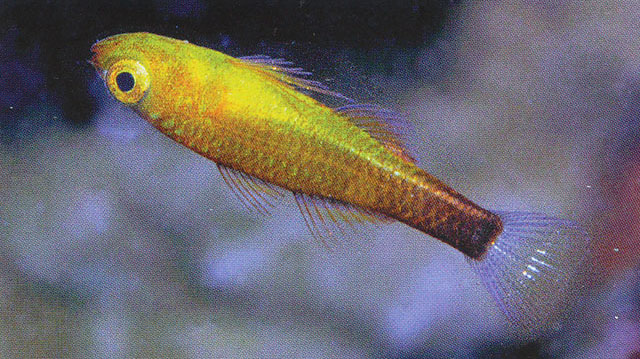| Gobiidae (Gobies), subfamily: Gobiinae |
| 2.3 cm SL (male/unsexed) |
|
benthopelagic; marine; depth range 10 - 30 m |
| Western Pacific. Japan to Australia. |
|
Dorsal spines (total): 7-7; Dorsal soft rays (total): 7-8; Anal spines: 1-1; Anal soft rays: 7-8. This species is characterized by the following: presence of scales in the predorsal midline and on the cheek and opercle; no elongate dorsal spines; a broad and somewhat concave interorbital region with a bony interorbital equal to about half or more of the width of the pupil with no raised, longitudinal, fleshy ridge in the midline; no postorbital trench; fifth pelvic fin ray usually unbranched (may be branched once sequentially); preserved specimens with a dusky body with densely scattered melanophores and chromatophores, the shade intensifying posteriorly to almost black in the peduncular region; body of alive or freshly collected specimens have yellow to dirty yellow-orange with scattered melanophores intensifying to a blackish or dark brown caudal peduncle, with median fins reddish-orange to yellow with a dark basal stripe, except for the caudal fin, which varies from almost translucent to yellow with whitish margins (Ref. 58123); characterized further by having longitudinal scale series 22-26; predorsal scales 7-8; depth of body about 4.4-4.6 in SL (Ref. 90102). |
| This species forms small schools which are sometimes mixed with T. tevegae. The fishes hover in caves, recesses or under the overhangs of coral reefs. When hovering, the ventral side faces the nearest substrate surface (e.g. the wall or roof of a cave) the same as with T. tevegae. However, T. flavatrum tends to be found more towards the back of the caves and recesses (Ref. 58123). |
|
Least Concern (LC); Date assessed: 11 March 2015 Ref. (130435)
|
| harmless |
Source and more info: www.fishbase.org. For personal, classroom, and other internal use only. Not for publication.

